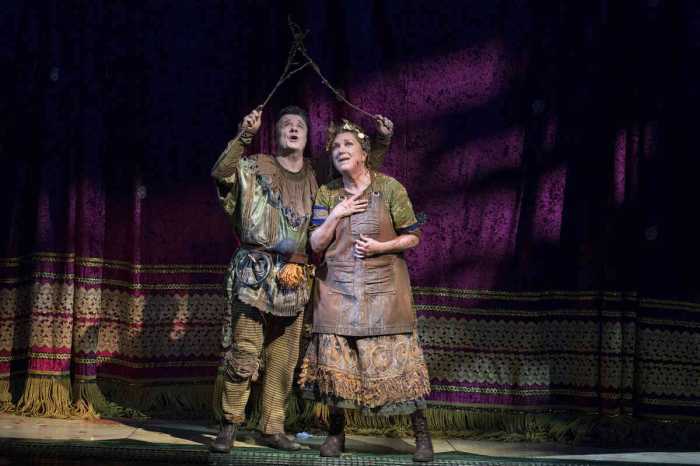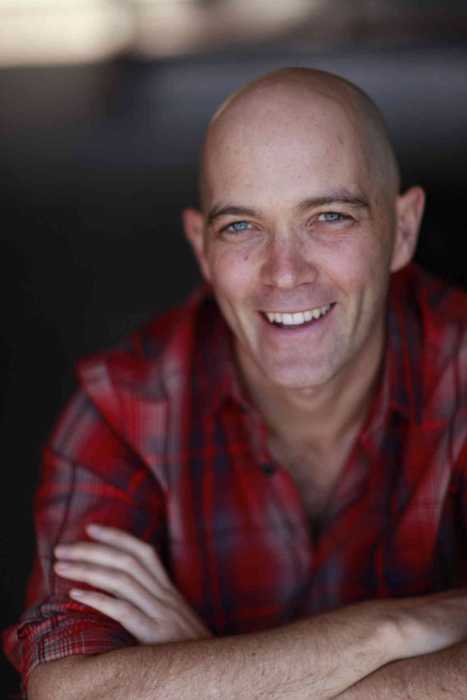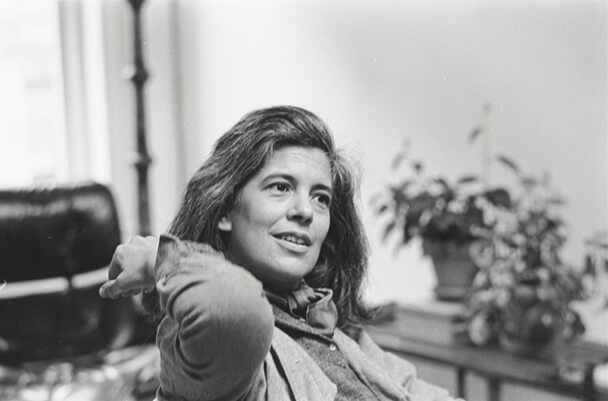Irascible veteran indie director Abel Ferrara is having quite the season, with a retrospective going on now at the Museum of Modern Art (through May 31; moma.org), which included his “Pasolini,” made five years ago, with Willem Dafoe in the title role, depicting the last days of the controversial director’s life when he was brutally murdered by supposed rough trade, a demise, however, still shrouded in mystery.
I caught Ferrara’s documentary, “The Projectionist,” at the Tribeca Film Festival on April 28, and I think it’s my favorite of all his films. Its simple theme is obsessive movie love, especially as felt by film exhibitor, Nicolas Nicolaou, who owns three independent movie houses in New York — Cinema Village and two long-established family-friendly venues, Bay Ridge’s Alpine Cinemas and Forest Hills’ Cinemart. A Greek immigrant from Cyprus who came to New York as a child, he became entranced by the screen early on, and found entry-level employment in various theaters, hustling away, before finally realizing his dream of owning them himself.
A lost, much grittier, and more affordable New York — the place I moved to in the 1970s — comes alive in the film, amidst waves of deep nostalgia that are not so much rose-hued as they are (and I mean this in the most affectionate way ) “La Vie en Scuzz.” Nico personifies the kind of innately rebellious product of a traditional, heavily ethnic background who, energized by Manhattan’s “anything goes” ethos, especially then, had to invent himself, in the most gratifyingly triumphant way. As he says in the film, through canny wheeling and dealing all of his life he is now a rich man, but — and this is truly exceptional — not a greedy one. He could have easily sold off any one of his theaters to make way for yet another high-rise for the rich, but such is his love for not just movies, but audiences, with the sincerest showman’s desire to provide the mot pleasurable film-going experience imaginable, he has stayed his beloved course.
Besides having a totally lovable, down-to-earth heterosexual mensch to fall in love with at the center of his film, Ferrara’s doc had, surprisingly, more frontal male nudity than I’ve seen in quite a spell. You see, while Nico has been a lifelong supporter of art house fare, in the early days he supported that predilection by also being involved in the porn industry. which, pre-video, was a booming one, especially for gay male audiences. A plethora of homo sin palaces existed in the now Disneyfied Time Square area: the Eros, Adonis/ Cameo, Big Top, Kings, and more. Copious clips of mustached clones hooking up in a matter of moments, followed by thrusting close-ups of their junk, reminded me of the singular openness Ferrara has shown in the past, with his democratic attitude toward balls-out nudity (Harvey Keitel in “The Bad Lieutenant” or Gerard Depardieu in “Welcome to New York,” for example). A highlight of the film is when Nico takes Ferrara on a bracing walking tour of the region, remembering where each and every grindhouse existed, now mostly tourist-friendly cockpits of the banal. He notes that there was often action off-screen, as well as on, in these places and that it never bothered him, as he chalks it up to human nature.
“Even in non-porno theaters, things happen in the dark,” he said.
It was good to discover that this man also has a happy personal life, with a family, having married a nice Greek girl who helps run his businesses from Cyprus and is a sculptor in her own right.
“You represent the ever-dwindling soul of the Manhattan I moved here for,” I told him at the swellegant, intimate after-party at his posh East Village club Vinyl.
“I love movies!” he said. “They taught me so much as a young Greek immigrant who only knew two sentences in English. At Cinema Village, I let young filmmakers who would probably never have their films theatrically released here, rent my theater so they can do just that, and my other two cinemas, the Alpine and the Cinemart, which is the oldest running independently-owned theater in the city, since 1925, were important to keep open, as generations of families have gone there together — and that tradition, those memories are precious.”
The multitude of events celebrating Stonewall 50 includes more than a month of special performances at the venerable La MaMa (May 23 – June 30), fully in the tradition of this theater, which has presented queer artists’ work since being founded in 1961 by the fabulous Ellen Stewart, who we lost in 2011. That heritage is something its current artistic director, Mia Yoo, respects and is determined to carry on. André De Shields, Harvey Fierstein, David Sedaris, amd Marc Shaiman and Scott Wittman are but a few of the hundreds of our tribe who have done work there.
Of definite interest is the Stonewall series is “13 Fruitcakes” (Jun. 13-15 at 7 p.m.; Jun. 16 at 3 p.m.), a cornucopia of musical vignettes from South Korea by Byungkoo Ahn and Gihieh Lee that focus on 13 famous LGBTQ personalities (including Eleanor Roosevelt, Alan Turing, Hans Christian Andersen, Gertrude Stein, Josephine Baker, and Frida Kahlo) and their enduring influence. Korea’s most famed drag performer, “MOre” Zimin, is one of the cast members.
Taylor Mac, whose very La MaMa-esque “Gary: A Sequel to Titus Andronicus” is baffling Broadway audiences uptown, will appear in the theater’s ongoing series, “Coffehouse Chronicles,” on June 8 at 3 p.m., discussing Off-Off-Broadway, where he first cut his glittering teeth.
And, kicking off the festival is another world premiere, Nia O. Witherspoon’s hip-hop musical “Messiah” (May 23-25 & 30-31, Jun. 1 at 8 p.m.; May 26; Jun.. 2 at 5 p.m.), which posits the 16-year-old son of Black Panther parents, Malika, who dreams up a trans alter ego, Messiah, who’s a wiz at basketball and rapping.
STONEWALL AT LA MAMA | La MaMa, 66 & 74A E. Fourth St.. btwn. Bowery & Second Ave. | May 23-Jun. 30 | lamama.org/stonewall“Mademoiselle Paradis,” which opened the Panorama Europe film festival at the Museum of the Moving Image on May 3, is like a grittier, if better dressed “The Miracle Worker” with culture, detailing as it does the true life story of Maria Theresa von Paradis (“Resi”), who was blind but became a noted pianist of her day, an intimate of Mozart, and a composer of numerous works, few of which survive today. And once more comes the infuriatingly rote reason as to her present-day obscurity, despite all of this: she was a woman.
Barbara Albert’s rigorous film finally gives this artist the prominence she deserves, while being as harrowing as it is inspiring. As much a portrait of a gifted girl, it is also a trenchant depiction of her world, 18th century Austria, to be exact, with all of its visual elegance as well as its much uglier realities: medical ignorance, class and family oppression, and the suffering of the lower orders (with the heinous “droit de seigneur” tradition of the patrician lords of a house able to freely have their sexual way with the help).
Albert was extraordinarily fortunate with her choice of leading lady. Maria-Victoria Dragus, known to international cinema audiences from Cristian Mungiu’s “Graduation” and Michael Haneke’s “The White Ribbon,” is a prodigious actress, only 23 when she made the film a couple years ago. At a Q&A following the screening, she explained she had two years to prepare for the role while Albert put the financing together, immersing herself in the period and also working with people in various stages of blindness to achieve her extraordinarily convincing performance. This is decidedly not an endearingly precocious depiction of blindness, as was Patty Duke’s celebrated performance as the young Helen Keller in “The Miracle Worker.” The film opens with an extended close-up of Dragus at the piano, and her intensity, with unseeing eyes that each seem to have a separate, crazy life of their own, is arresting, even hard to take.
With the aid of a doctor, Franz Anton Mesmer (Devid Striesow), who was probably a charlatan but nevertheless deeply committed, Resi somehow regained her sight for a while, before being devastatingly hurled back into darkness. The mood of the film lightens considerably during her brief hopeful episode, and truly amusing are the scenes in which a lavishly bedecked entourage follows Resi, amazed by and commenting on her passionate, often hilarious reactions to a world she can suddenly see.
The liberal doses of classical music by the likes of Bach and Handel, which Resi plays so intently, prove to be the perfect, somberly beautiful accompaniment to her tale, and the entire production, with a gratifyingly all-female crew behind the camera, is often gorgeous to behold, permeated with a rare, febrile sensitivity. This was obviously a deep labor of love for all concerned and, even if it does not get a New York theatrical release, this highly worthy film is available now on Amazon.




































